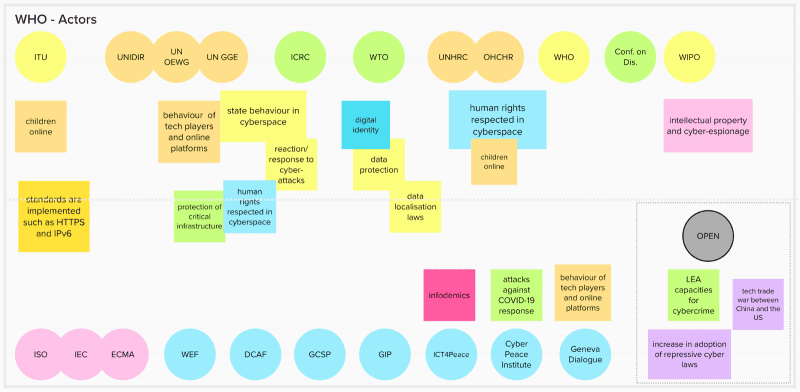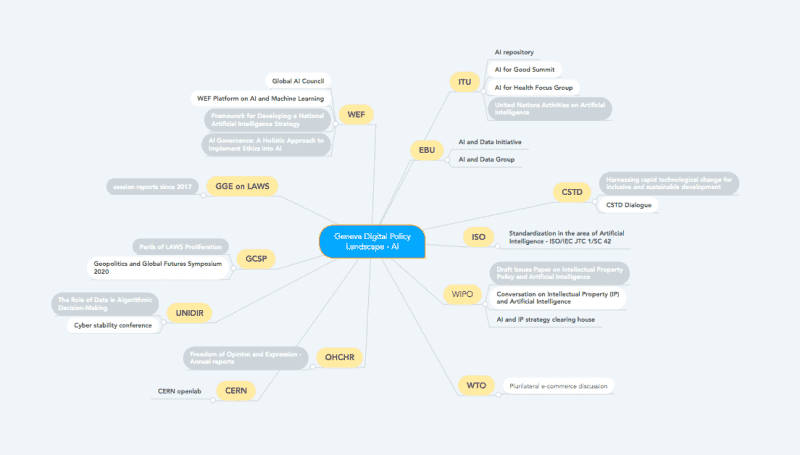Event summary
Most Geneva-based institutions and organisations are now tackling digital aspects as part of their work. The Geneva digital policy landscape has therefore become richer and more diverse. How can we navigate through this landscape and understand who is dealing with what, how to overcome policy silos, and how to build on the work of, and collaborate with, other organisations to pursue common goals and solutions?
Navigating Geneva’s digital policy landscape was the subject of an online conference organised by the Geneva Internet Platform (GIP) on Tuesday, 23rd June 2020. The event brought together over 100 practitioners from Geneva, and the world, to discuss various approaches and initiatives.
Geneva’s vibrant policy landscape
Inclusivity, connectedness, and proximity are three words that can accurately describe Geneva’s vibrant policy landscape. Delivering his opening remarks, Mr Oliver Hoehne (Head, Global Affairs, Multilateral Division, Mission of Switzerland to the UN in Geneva) stated that with the quantum leap in video conferencing and hybrid meetings, International Geneva is now closer to other capitals and to New York, enabling practitioners from other hubs to get more involved in what goes on in Geneva and vice-versa.
Through their work, actors in Geneva are now even more connected. Permanent missions are designating staff members to cover cross-cutting digital issues. Since collaboration still requires a degree of physical proximity, Geneva’s short physical distances makes it an ideal location for dealing with normative, policy, and operational issues through multistakeholder diplomacy.
In his opening remarks, Mr Olivier Coutau (Delegate, International Geneva, Republic of Geneva) described Geneva as a global co-operation centre with hundreds of international organisations, NGOs, and permanent missions, and more than 32 000 people.
The issue now is how to make sure that people benefit from the volume, richness, and variety of Geneva. Maps that tell us who’s who, and who is doing what, are very useful. The most comprehensive guide on who’s who and what is happening in Geneva is curated by ‘Genève internationale’. When it comes to digital activity, GIP’s work in the past few years has been helpful in guiding us through numerous Geneva-based actors.
There are thousands of digital policy mechanisms in Geneva and beyond, said Prof. Jovan Kurbalija (Head, GIP; Executive Director, DiploFoundation), and sometimes we are not aware that, for instance, 5G is discussed in several organisations. Using a telephone-call analogy, he explained that there are various entry points to the work of Geneva-based actors.
Digital issues also pose a challenge due to their cross-cutting and multidisciplinary nature. The ongoing ‘Road to Bern via Geneva’ initiative, which tackles data policy from various angles, is an example of the richness and the complexity of digital issues.

What are the ‘mapping’ needs of different communities?
Stakeholders play various roles in shaping digital policy. In return, they need guidelines and tools to help them navigate through the numerous initiatives, processes, and forums for discussion and decision-making. What are the specific needs of different stakeholder groups, and how can mapping initiatives and tools serve these needs? The conference included four breakout sessions which explored the needs of four stakeholder groups.
Diplomatic community
The discussion on the needs of the diplomatic community, led by Ms Katarzyna Gorgol (Adviser, Digital Affairs and Telecommunication, Delegation of the EU to the UN in Geneva), highlighted three types of challenges that permanent missions face on Geneva’s vibrant digital scene.
First, traditional tech issues, covered by the International Telecommunication Union (ITU) and standardisation organisations, have an increasing broad impact on society. Permanent missions must now follow the growing tech agenda and tech issues, which even may seem technical at first glance are becoming more politically relevant.
Second, traditional policy fields, including health, trade, and humanitarian aid, are becoming digital very quickly. The policy agendas of the World Health Organization (WHO), the World Trade Organization (WTO), and other international organisations are becoming increasingly ‘digital’.
Thus, permanent missions in Geneva must provide fast cross-cutting coverage of policy issues beyond the traditional silos and report to capitals.
Our discussion highlighted the examples of how permanent missions cope with this major challenge, which affects both large missions (in overcoming their internal policy silos) and small missions (in coping with increasing digitization of multilateral diplomacy, while having limited human resources). Clearly, the Geneva Internet Platform provides useful help to diplomats to navigate in the digital policy landscape.

International organisations
The conversation on the needs of international organisations (IOs), led by Mr Torbjörn Fredriksson (Chief ICT Policy Section, UNCTAD), emphasised the need to break down the silos between various IOs to promote collaboration and avoid duplication. While some IOs have digital policy issues as part of their core mandate, no Geneva IO is left untouched by digitisation.
Participants strongly felt that there is a need for a mapping exercise. From the perspective of the global South, this need for mapping is even more urgent and, beyond that, there is a need to find ways to include participants from the global South more actively in the Geneva ecosystem. It was suggested that some discussions taking place in Geneva are not open, inclusive, nor transparent enough. In some cases, key documents should be available more easily. The participation of civil society needs more active support, and existing barriers to participation, such as participation fees, need to be removed.
Going further, there was a suggestion for creating a centralised place for supporting various actors in orienting themselves within the Geneva digital policy landscape, fully leveraging existing mechanisms. For example, in the area of digital trade, eTrade for all already functions as a kind of help desk, analogous to the suggestion made in the UN Secretary General’s Roadmap for Digital Corporation, launched this month. Similar initiatives could be established in Geneva in other digital for development fields.
The discussion revealed a further need to understand precisely who is doing what. For example, the use of data by various IOs, and their data policies, could be mapped with a view to create synergies and learn from best practices. Looking at the ‘journey of data’ from collecting, via storage, analysis, and dissemination, to use, will further evidence-based decision-making and budgeting. It was also important to make sure information about IOs in Geneva is effectively shared with member states in New York.
Ultimately, the session participants felt it is important to work towards a firmer governance of digital policy issues in Geneva to build common ground on terminology, practices, and norms, and to formalise collaboration between various IOs a little bit further.

Media
For journalists, covering the digital Geneva ecosystem is generally challenging due to its complexity. The COVID-19 pandemic and the elimination of face-to-face contact due to working from home, has, however, brought about an instructive learning experience. Another experience lies in ‘infodemia’, as former journalist Ms Paola Ceresetti (Spokesperson, Permanent Mission of Switzerland to the UN), leading this session, named it. With the overflow of information – not always verified – journalists have to navigate through the environment even more carefully.
Not to complain about the challenges, but it is essential to look into the possibilities emanating from the experience. For instance, even journalists not physically based in Geneva had more access due to the use of virtual tools. The pool became much more competitive, since journalists from other parts of the world were also working from home, and were just a phone call away. Typically, journalists in Geneva, often specialising in narrow fields, benefit from quite privileged access to actors and stakeholders.
When inquired about the future of press briefings and similar actions in Geneva, the need of creating a safe space for journalists was understandably brought up.

Private sector
The private sector was, and still is, a leader in digitalisation. Governments and international organisations, including UN agencies, have only recently started catching up. Yet, the private sector may find it challenging to follow the Geneva-based digital policy discussions.
Session moderator Mr Jean-Yves Art (Senior Director, Strategic Partnerships, Microsoft) invited participants – which included representatives from the private sector, think-thanks, academia, and international organisations – to identify these challenges.
Session participants recognised that Geneva brings ‘higher purpose’ elements (commons such as global health, environment protection, and digital security) to the global discussion, and shapes the social contract through inclusive discussions and institutions. One view was that there are a number of actors that help build bridges across the silos. Still, it is rather chaotic, which may be, to some extent, even welcome. There are lots of ingredients in Geneva, but the recipe is still missing.
The business sector may need to place more policy people in Geneva in order to follow the dynamics. While this approach is already taken by businesses, in regard to deliberations in Brussels or Washington, some may still see Geneva as a place that does not bring decisions.
Another challenge is mapping who is doing what in a plain and understandable language, rather than an administrative one. The ‘Road to Bern’ events, organised by Swiss authorities and DiploFoundation, were commended as an example of a clear gateway for all stakeholders to understand the context and participate.
Interestingly, one comment highlighted the important and practical limitations of Geneva: due to the number of important events, Geneva is often overcrowded and expensive, which does not attract all businesses to get involved. A participant suggested the International Geneva Welcome Center for supporting and facilitating the stay of visiting delegates to Geneva. It was also suggested that, in light of the new COVID-19 reality, Geneva should include more online and/or hybrid events to enhance its outreach and inclusiveness.

Mapping digital policy areas: Approaches and initiatives
With digitalisation affecting practically every aspect of our lives, the policy area around digital and technological developments is becoming increasingly broad and complex.
Referring to his ongoing work for Fondation de Geneve on Internet governance as a centre of excellence in Geneva, Prof. Michael Kende (Visiting Professor, Graduate Institute in Geneva; Senior Advisor, Analysys Mason) said that Geneva-based actors are often quite shy about promoting their work in Geneva regarding digital issues.
Relying on the taxonomy of issues and GIP’s descriptions of what global actors do, Kende explained that interviews and personal contacts are needed to dig deeper into the work of Geneva-based actors. He encouraged organisations to be more forthcoming with details on their digital policy work, as well as their collaboration with other organisations, especially on their websites. This would help map and weave areas together.
Kende said that, in addition to existing mapping initiatives, actors working on policies should also come together to promote Geneva-based work beyond its shores, and build on the cross-cutting work of other policy hubs.
Referring to DiploFoundation’s 20-year experience in mapping initiatives, Prof. Jovan Kurbalija explained how the GIP started the mapping of Geneva actors for the Swiss Federal Department of Foreign Affairs (FDFA) five years ago. The GIP is now working on The Geneva Digital Atlas which will emphasise collaborations among organisations regarding digital policy.
As the coverage of the World Health Organization (presented at the conference as an example from the Atlas) shows, mapping initiatives need to bring out the interlinkages among the work of actors, and emphasise the various entry points in order to connect what is being done in various areas. The Atlas, which is powered by AI analyses of documents and instruments, will encourage actors to approach digital policy through various angles, and strengthen collaboration among stakeholder groups.
Kurbalija also explained how the Geneva digital policy landscape is evolving. Permanent missions will face increasing pressure from capitals to follow digital policy discussions which are becoming mainstream issues (e.g. ‘digital health’ is becoming ‘health’). Complex policy issues are additionally requiring actors to analyse issues deeper at the risk of reducing the chances of horizontal, cross-cutting analyses.
Mr Chengetai Masango (Head, UN Secretariat of the Internet Governance Forum (IGF)) said that a common taxonomy, such as DiploFoundation’s taxonomy of digital policy issues, helps people speak the same policy language and understand each other.
On the evolution of Geneva’s policy landscape, Masango explained how COVID-19 has impacted policy processes by shifting many meetings from in situ to online. In the process, the pandemic is exposing limitations related to voting procedures, as they move from conference halls to the Internet.
COVID-19 has also highlighted certain issues, including the spread of misinformation and propaganda, as well as access and connectivity as prerequisites for fulfilling basic human needs (such as healthcare and education).

How can we navigate through specific policy areas?
Mapping initiatives helps bring clarity to who does what. What do existing mapping initiatives tell us about specific digital policy areas in Geneva, such as cybersecurity and SDGs? How are these policy areas developing? Four breakout sessions explored Geneva’s landscape across four specific policy areas.
Cybersecurity
The Cybersecurity breakout session, led by Mr Vladimir Radunović (Director Cybersecurity Programmes, DiploFoundation), aimed to map the interlinkages between the silos of Geneva-based organisations on cybersecurity topics. It focused on two pillars: identifying topics related to cybersecurity policies, and matching those topics with the Geneva-based organisations which tackle them. The session used a collaborative tool to undertake this mapping, and participants were invited to edit the workspace during the discussion.
The topics the participants identified included: data protection; data localisation laws, state behaviour in cyberspace, and the protection of critical infrastructure from cyber-attacks; improving resources and skills of law enforcement so they can identify and investigate cybercrime; the behaviour of tech companies and digital platforms; solving the issue of digital identities on a global level; ensuring the implementation of minimal existing standards such as HTTPs and IPv6; the effective oversight of cyber actions; ensuring that human rights are respected in cyberspace; the applicability of international law in cyberspace; intellectual property aspects of data; the increase in adoption of repressive cyber laws; and reaction/response to cyber-attacks.
The results of the collaborative exercise linking actors with issues can be seen in the mural below.

Data and AI
The Data and AI breakout session, led by Dr Katharina Hoene (Senior Lecturer, Researcher, and Project Manager, DiploFoundation), aimed to identify the Geneva-based actors dealing with artificial intelligence (AI). The discussion kicked off with an overview of some of the actors that have been identified in the mapping so far, including the World Intellectual Property Organization (WIPO), the International Organization for Standardization (ISO), and the UN Institute for Disarmament Research (UNIDIR).
An underlying challenge, which emerged at the outset of the discussion, was that participants had a hard time ascertaining which exact actors are working on AI. Further confusion arose from the uncertainty over what ‘working on AI’ means exactly. Referring to the multidisciplinarity of the field, participants asked whether it refers to the technical development of AI, and umbrella concepts such as machine learning, or policy and the regulation of AI, or to both.
Considering the versatility of the topic, the participants raised arguments on the definition of AI and how individuals who are not all too familiar with the technical vocabulary (that dominates many AI discussions) can navigate through the rich landscape, not only in Geneva but also in other tech ecosystems.

Sustainable Development Goals (SDGs)
The third breakout session, led by Ms Aziyadé Poltier-Mutal (Head, Perception Change Project, UNOG), explored Geneva’s landscape through the lenses of SDGs, and focused on SDG mapping activities conducted by various organisations to raise awareness about the studies and gather ideas on how to collaborate more effectively on these issues.
Ms Poltier-Mutal provided the participants with some details on the mapping conducted by the UN office in Geneva (UNOG), which brings together organisations under the same methodology, and categorises their work towards achieving the common goal.
Participants also discussed the relation between the SDGs and digital technologies. Although SDGs are very shy about digital aspects, meaning that only a handful of them and their targets explicitly refer to information and communications technology (ICT), participants agreed that we cannot achieve them without digital technologies. Opportunities for the SDGs to guide the development of AI was also addressed by the attendees, and seen as insufficiently tackled by the AI community.

E-commerce
The discussion on how to navigate the field of e-commerce in Geneva, led by Ms Marion Jansen (Chief Economist, International Trade Centre (ITC)), started with a discussion on the forums where e-commerce and trade aspects are tackled. Some participants argued that issues already agreed in other forums – such as e-signatures, spam, or privacy – should not be re-discussed in trade negotiations forums.
Regarding mapping initiatives that describe the work of actors, it was suggested to expand these mappings to Geneva actors which are not purely trade agencies (those being WTO, UNCTAD, ITC), and therefore to include actors such as CUTS International, Diplo, the Enhanced Integrated Framework, ILO, ITU, South Centre, UNECE, UNCITRAL, UPU (in Bern), WEF, and WIPO. Initiatives, such as UNCTAD’s eTradeforAll, already bring together all these actors. In this context, the question was raised whether the result of mapping exercises would differ depending on the objective of the mapping exercise.
Another suggestion was to expand mapping initiatives to include regional trade agreements. As we are seeing from the Joint Statement Initiative discussions at WTO (which are discussions among a smaller group of WTO members who in January 2019 agreed to launch e-commerce talks), issues discussed in Geneva find their roots in national laws or regional agreements which are already promulgated or agreed upon. By looking at regional agreements, issues that will emerge in trade negotiations in Geneva can be better anticipated.

The two-hour interactive online discussion, which included virtual coffee-breaks and speed-networking, was organised by the Geneva Internet Platform with the support of DIplo’s Creative Lab and ConfTech Lab. This report was written by Diplo’s digital policy team.
Event description
Most Geneva-based institutions and organisations are now tackling digital aspects as part of their work. The Geneva digital policy landscape has therefore become richer and more diverse. How can we navigate this landscape and understand who is dealing with what, how to overcome policy silos, and how to build on the work and collaborate with other organisations to pursue common goals and solutions?
In addition to well-established digital policy areas such as cybersecurity, e-commerce, and human rights online, digitalisation is impacting other policy areas. Health aspects include the use of health data, which has become essential for public health and medical research. Digital technology can significantly address climate and environmental issues. The attainment of the sustainable development goals relies on the advancement and use of digital technology and digital solutions.
Knowing how to navigate such a rich landscape is crucial in dealing with digital issues. What are the needs of the different stakeholder groups, namely the diplomatic community, international organisations, and the media? What would be a good approach to understanding policy issues, and how we navigate specific policy areas in Geneva, such as data, SDGs, cybersecurity, and e-commerce?
Join the Geneva Internet Platform (GIP) online on Tuesday, 23rd June 2020, 13:00–15:00 CEST (11:00–13:00 UTC) for a timely discussion on how to navigate Geneva’s digital policy landscape.
For more information and to register, visit the dedicated webpage.











